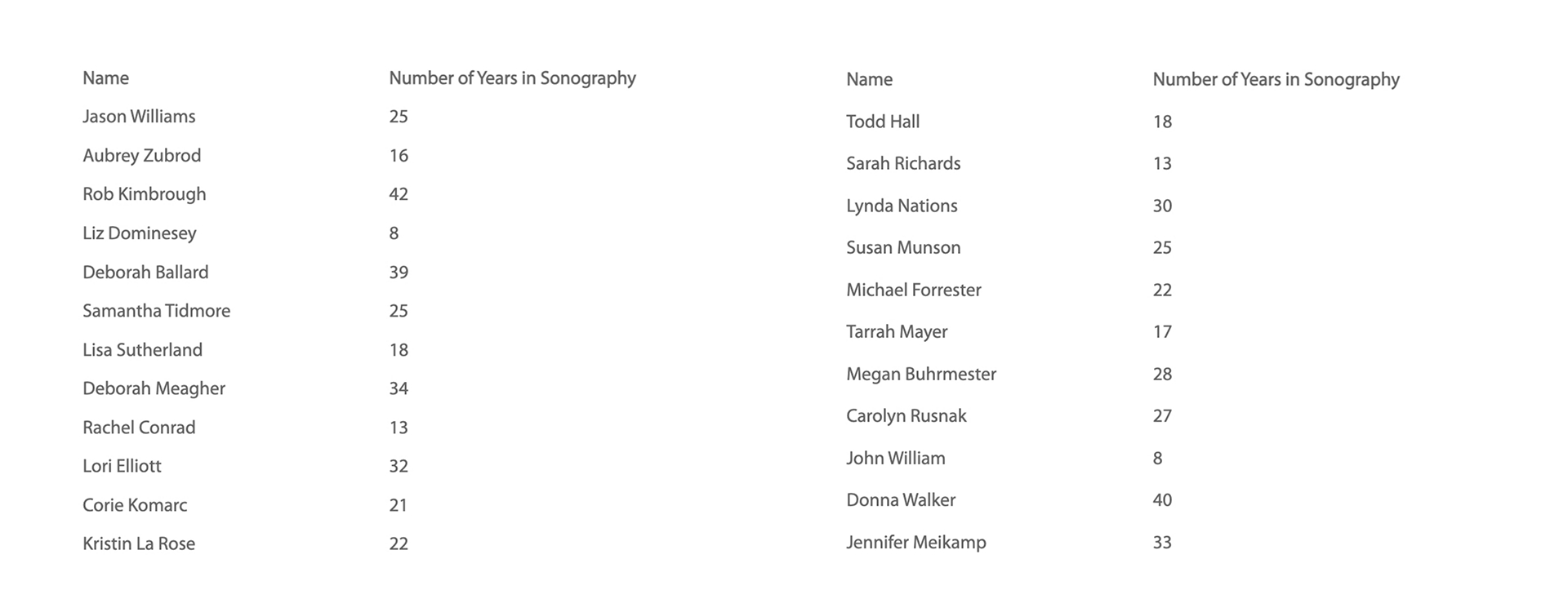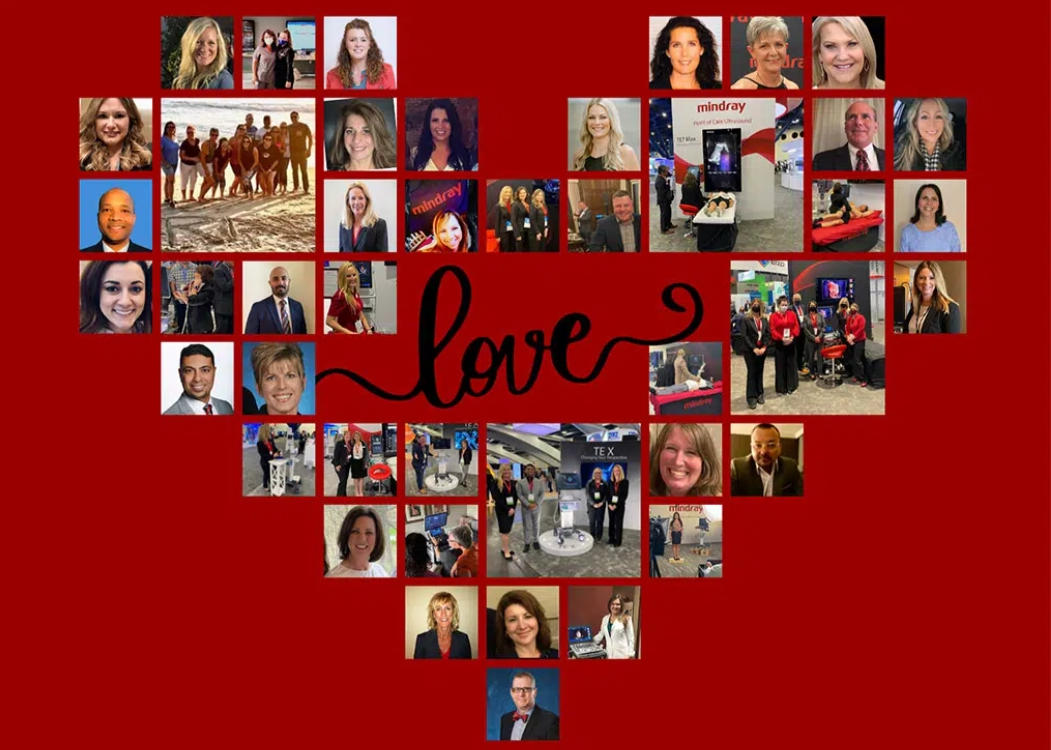Sonographers are at the core of ultrasound and directly influence patient care. In order to be an effective diagnostic sonographer, a wide range of abilities are required that entail both physical and mental acuity. These clinicians must embody many talents, including the ability to provide compassionate care, keen attention to detail, excellent communication skills, a passion for learning, and even expert hand-eye coordination. These are just a few distinctive and diverse characteristics that make up a successful sonographer, which is why being a sonographer is no small feat. Sonographers are key players in the continuum of care that continuously go above and beyond the call of duty. A career as a diagnostic sonographer is challenging, but it is also incredibly fulfilling.
At Mindray, we are lucky to have over 28% of our Ultrasound team members be sonographers who have transitioned from patient-facing clinical care to the Mindray team. During Medical Ultrasound Awareness Month (MUAM), we wanted to share highlights from some extraordinarily talented sonographers who continued their careers with us to develop and deliver leading-edge ultrasound solutions and make healthcare more accessible.
Recently, our Marketing team members connected with 23 of Mindray’s talented sonographers to learn more about them, what they love about the industry, where they see the industry going, and why they chose Mindray. In this interview, you’ll get insights from:

What are some of the most rewarding aspects of being a sonographer?
Jason Williams: Using investigative and problem-solving skills to share directly in the diagnosis process.
Aubrey Zubrod: I love being able to help people, especially helping others and saving other people’s lives.
Rob Kimbrough: Being able to give the patient an answer to their complaints/symptoms.
Liz Dominesey: Helping save lives, directly impacting patient care, help diagnosing life-threatening diseases, and supporting caregivers.
Deborah Ballard: Helping to find answers to patients’ health concerns, giving them confidence that they receive high-quality healthcare.
Samantha Tidmore: Sonography is an art that takes patience and a mindset always to strive to get the best images for each patient. I pride myself on getting those images and treating each person with kindness throughout the scan.
Lisa Sutherland: The ability to provide answers to medical questions to both the patient and the physician.
Deborah Meagher: The feeling of helping someone get an answer for their symptoms. It’s even better when there is a solution, so they can get back to living their best life.
Rachel Conrad: Being able to clinically answer medical questions cost-effectively and safely is really impactful for the patient and, ultimately myself.
Lori Elliott: Knowing I can make a difference in someone’s life by making them feel cared for while they are with me to help find the answer to their medical concerns.
Corie Komarc: Helping others and having the ability to make a difference in others’ lives.
Kristin La Rose: I have always appreciated the one-on-one time with patients, providing quiet moments of healing in a patient’s health care journey.
Todd Hall: There is an opportunity to positively impact another person’s life every single day. Not just with compassionate interaction but by having a role in determining an appropriate course of care for them. A course that typically leads to healing.
Sarah Richards: Being a part of the diagnosis that leads to the care that the patient.Lynda Nations: Sonography is constantly changing because the technology is improving so rapidly on ultrasound machines, especially in POC. I love being on the cutting edge of technology and offering these advancements to physicians. It is very rewarding!
Susan Munson: I enjoy the ability to care for and help people in their time of need. I also think of Sonography as an artistic endeavor.
Michael Forrester: Making a difference in people’s lives. Lots of growth, and it keeps you on your toes.
Tarrah Mayer: Being part of a treatment team to cure or improve a patient’s outcome. The feeling of making a positive impact on one’s life.
Megan Buhrmester: For me, it has always been about helping people – knowing you’ve made a change in someone’s life, however small it may seem.
Carolyn Rusnak: Being part of assisting in making a diagnosis that could positively impact someone’s life and spending that exam time with patients and learning about their lives through their personal stories.
John William: Interacting with patients and engaging in patient care – It is my passion to help people while advancing my skills in ultrasound.
Donna Walker: Sonographers make a difference in medical treatment from the start to the outcome, with confirmation follow-ups. Knowing ultrasound’s magnitude in diagnosis is very gratifying.
Jennifer Meikamp: Providing empathy, care, and building relationships with patients, coworkers, and physicians.
“There is an opportunity to positively impact another person’s life every single day. Not just with compassionate interaction but by having a role in determining an appropriate course of care for them. A course that typically leads to healing.”
– Todd Hall
What characteristics, attributes, and skills do you feel make a great sonographer?
Jason Williams: Compassion, Creativity, Curiosity, Confidence.Aubrey Zubrod: A great sonographer would be thorough, efficient, organized, kind, apathetic, and caring.
Rob Kimbrough: A person that will continue to search for the correct answer. Thinking “outside the box.”
Liz Dominesey: Compassionate, emotionally intelligent, analytical, awareness, friendly, positivity, level-headed, respectful, and trustworthy.
Deborah Ballard: A passion for getting the best imaging and diagnostic information for patients, a willingness to be open to new technologies, the ability to learn from others, and an understanding that ultrasound is a medical art form. You need to have the mind of a medical detective.
Samantha Tidmore: Communication and explaining what you are doing and what you will focus on. Also, a passion for providing the best information you can for the reading MD.
Lisa Sutherland: Empathy, compassion, attention to detail, and multitasking.
Deborah Meagher: Being passionate about what you do and always striving to learn more.
Rachel Conrad: Experience and a lot of hard work made me a great sonographer. I take so much pride in doing a thorough exam while taking exceptional care of patients.
Lori Elliott: Caring, patience, and tenaciousness.Corie Komarc: Caring, hardworking, and loves being challenged, day to day, patient to patient.
Kristin La Rose: Detail-oriented, Patient, able to listen and follow directions, Self-reliant.
Todd Hall: Compassion, empathy, and a sense of humor.
Sarah Richards: Compassionate, patient, and having empathy. Lynda Nations: I think sonography is the best combination of science and art. You are making pretty pictures along with a diagnosis for the physician.
Susan Munson: I feel being empathetic, caring, and a compassionate person are key components for a Sonographer. I feel being curious and detail-oriented makes the most successful Sonographer in understanding the patient’s problems.
Michael Forrester: Highly motivated, self-disciplined, academically able, and able to make decisions.
Tarrah Mayer: Attention to the most minute detail; it can be life-changing.
Megan Buhrmester: Compassion, kindness, awareness. A firm grasp of cross-sectional anatomy, knowing the machine well to provide stellar imaging to help with Radiologist interpretations. Willingness to help in whatever capacity possible to make a patient’s experience as positive as possible.
Carolyn Rusnak: Definitely kindness, compassion, humility, and patience. It also requires a bit of artistic ability. I believe having a sense of humor is also important, and being able to laugh with your coworkers through stressful, busy days.
John William: Technical skills, such as eye-hand coordination, the willingness to keep on learning and striving to excel, compassionate and interpersonal skills, professionalism, great with patient care, and a willingness and skills to educate others.
Donna Walker: Characteristics that make a good sonographer are caring, continual learning, communication, and excitement, knowing ultrasound is the medical modality on the rise.
Jennifer Meikamp: They have to be kind, caring, and always thinking outside of the box to know what to evaluate, why, and what else is related to disease processes.
“Compassion, kindness, awareness. A firm grasp of cross-sectional anatomy, knowing the machine well to provide stellar imaging to help with Radiologist interpretations. Willingness to help in whatever capacity possible to make a patient’s experience as positive as possible.”
– Megan Buhrmester
What advice do you have for sonography students or people considering a career in the ultrasound industry?
Jason Williams: You are making one of the best decisions of your life! Keep learning. Don’t be afraid of change. Remember that your hands-on role allows you to connect with your patient in a unique way, so put your heart into your work. Don’t forget about the human/feeling aspect your role affords you.
Aubrey Zubrod: It’s one of the best medical fields you can get into. There are so many different avenues you can take with ultrasound. You’ll love it.
Rob Kimbrough: Ultrasound is continuing education. Don’t get satisfied with completing “school.” Now the education begins, after your training. Don’t scan a patient without “knowing” what you should find! Look for the answer.
Liz Dominesey: Willingness to work with and being respectful to other healthcare professionals, as well as being compassionate and providing quality care to all patients and caregivers
Deborah Ballard: Don’t do it because it’s “cool” do it because you want to help patients, and clinicians get the answers they need to help patients.
Samantha Tidmore: Do it. Never look back. I have zero regrets about choosing sonography.Lisa Sutherland: Shadow, shadow, and shadow some more to get a true sense of what this career entails.
Deborah Meagher: It’s not easy. There is always more to learn. Also, you have to be able to deal with the emotions of having to work with people who are sick.
Rachel Conrad: This career is awesome! Technology is continually growing and there are so many opportunities to grow within the field.
Lori Elliott: You make the difference in your education; give it all you have.
Corie Komarc: Try to shadow and do some research before getting into ultrasound to ensure it is the right fit for you. It is extremely rewarding when you truly love what you do and do what you love while caring for others along the way.
Kristin La Rose: Approach this career because you have a genuine interest in healthcare. Be flexible and open to change; healthcare is a forever-changing industry. Have the ability to self-validate, knowing you are doing a great job and providing service to your patients without external expectations.Todd Hall: Do it, love it, and never stop learning.
Sarah Richards: Follow ergonomic advice!Lynda Nations: It is an extremely rewarding career. That is the reason I have been doing it for so long and love going to work every day.
Susan Munson: I would recommend going to an ultrasound school or hospital to shadow a sonographer to understand the position and job.
Michael Forrester: Go for it! Great career with lots of potential growth.
Tarrah Mayer: The reward for the hard work that it takes to do this job well is worth it.
Megan Buhrmester: Get lots of massages and watch your body mechanics!
Carolyn Rusnak: I would recommend working in a busy teaching hospital right after graduation to gain experience. It is a lot of fun teaching residents and fellows and learning from them as well. What you will see and learn in an academic institution is irreplaceable for this career.
John William: To have the passion and love for patient care, striving to be better. Eagerness to always learn and be on the forefront of new technologies that become available to help with diagnosis.
Donna Walker: There are more users now than ever before. Nurses, Anesthesiologists, Physicians, Sonographers, and others have an opportunity with ultrasound advancements.
Jennifer Meikamp: Always scan a patient with an open mind and never go in thinking you know what you will find. I found my career to be very supportive of my family life, and I was able to live comfortably financially by pushing my registries with education.
“Approach this career because you have a genuine interest in healthcare. Be flexible and open to change; healthcare is a forever-changing industry. Have the ability to self-validate, knowing you are doing a great job and providing service to your patients without external expectations.”
– Kristin La Rose
Where do you see opportunities for advancement in sonography?
“When I started in ultrasound, I thought that was it; What we were doing then was the limit of what we could do. All the advances over the years have shown me that we can keep pushing barriers to extend ultrasound in areas we never imagined.”
– Deborah Ballard
Jason Williams: Specialization fields, such as neuro sonography, maternal-fetal medicine, advanced practice cardiac and vascular specialist, and musculoskeletal sonography.
Aubrey Zubrod: You can get into supervising, managing, teaching, applications, sales, etc. You can work in hospitals, schools, ultrasound companies, etc. There are so many great possibilities.
Rob Kimbrough: Musculoskeletal ultrasound! Very few sonographers can scan the tendons, muscles, and ligaments. This is a new field that will continue to grow.
Liz Dominesey: Clinical Applications, Clinical Sales, Lead Sonographers, Management, Department Head, Clinical Instructors, Adjunct Professors.
Deborah Ballard: When I started in ultrasound, I thought that was it; What we were doing then was the limit of what we could do. All the advances over the years have shown me that we can keep pushing barriers to extend ultrasound in areas we never imagined.
Samantha Tidmore: It depends. Maybe you will want to expand your skill set into another modality and another registry or go into another industry -the opportunities there are life-changing too.
Lisa Sutherland: Advanced technologies using AI tools to help mitigate user error.
Deborah Meagher: In sonography itself, technology is always advancing. Everyone involved strives for quicker, easier, and more accurate ways to gather information to directly help the patient. For the tech, there’s an opportunity to advance to a Lead, Manager, or Administrator and learn other modalities.
Rachel Conrad: Management, physician assistant, applications specialist, medical device sales.
Corie Komarc: You have so many options within ultrasound, from General to OB, to Vascular to Cardiac. Options beyond those include managing, teaching, and, my personal favorite, clinical ultrasound applications.
Kristin La Rose: Sonography is an amazing career choice. As technology continues to grow exponentially, we are always forging new frontiers as to where ultrasound/sonography can be utilized.
Todd Hall: Underserved communities and developing countries.
Lynda Nations: I think artificial intelligence has made significant advancements over the past five years. It is going to improve patient care and decrease patient scan time. I’m very excited to see how it will change sonography for the better in years to come.
Susan Munson: The industry is an older group, so Ultrasound Teaching and Schools will be in greater demand to keep up with the number of Sonographers leaving the field. The demand for Echo and Vascular Technologists is only increasing due to the aging population.
Michael Forrester: This would depend on the individual. There are management, research, business opportunities, and clinical applications.
Tarrah Mayer: The sonography industry is still in its infancy stages. It is amazing to see how far technology has advanced in this field, and it is so cost-effective and non-invasive compared to other modalities.
Megan Buhrmester: We are just scratching the surface of what ultrasound is capable of – I hope to see a greater presence in interventional radiology – and more actual transducer technology on the ends of microcatheters for intravascular assessments.
Carolyn Rusnak: Sonography is a great profession and there are many avenues you can progress to within the field. Some are clinical, management, education, and clinical applications. I love my job, and I am grateful for all of my experiences along the way.
John William: The ability to detect any problems in the heart early enough in life before it starts to fail through Strain Analysis has become possible.
Donna Walker: Sonography continues to become the industry’s leader for diagnosis. Sonography is branching out into every department in the medical field and becoming imaging’s first choice for diagnosis due to the advancements in technology and nonionizing imaging.
Jennifer Meikamp: You can study and challenge registry boards to make yourself more marketable. This will definitely open doors for you to make you able to choose the path best for you.
“I think artificial intelligence has made significant advancements over the past five years. It is going to improve patient care and decrease patient scan time. I’m very excited to see how it will change sonography for the better in years to come.”
– Lynda Nations
How is Mindray making an impact in ultrasound?
Jason Williams: Mindray develops technologies that take ultrasound imaging to the next level. By tackling previously unaddressed barriers of ultrasound, Mindray has produced tools that increase diagnostic confidence and broadens the application of ultrasound in clinical settings.
Aubrey Zubrod: Mindray is definitely changing the way ultrasound is being used. To be able to use the new AI and quickly assess a patient within seconds is a huge feat. I am very proud of what I do and where I work.
Rob Kimbrough: Producing incredible ultrasound systems at an affordable price – there is no reason any hospital, clinic, or office can’t have a great product.
Liz Dominesey: Mindray provides customizable, enhanced diagnostic imaging, which contributes to providing quality patient care. Our solutions are innovative and use advanced technology to improve ultrasound imaging. We provide exceptional customer support and care about the wants and needs within an ultrasound workflow and user feedback to make the technology possible.
Deborah Ballard: Mindray and its employees are passionate and dedicated to improving diagnostic healthcare and making it available to all.
Samantha Tidmore: I enjoy our culture; we work to keep a family feel here. There is support here to help each other grow personally and professionally.
Lisa Sutherland: Continuous development of new technologies made possible by the abundance of raw data collected from exams.
Deborah Meagher: Mindray has already made a huge impact with Zone Technology; every other company is now mimicking the technology because they know it works. Mindray cares about its employees. There’s a culture of teamwork and striving to make healthcare better. Mindray prides itself on always being innovative.
Lori Elliott: I think Mindray is giving sonographers the ability to have a high-quality ultrasound system and an economical solution for their lab.
Corie Komarc: Mindray’s living technology, unlike other companies who charge for upgrades after the initial sale, the Mindray’s continue to grow and evolve with them and their labs at no additional cost for five years. It is so exciting to see their faces light up when showing them certain enhancements, such as the high frame rate STE or new technologies, such as glazing flow, for the very first time. It makes them feel like it’s Christmas, compliments of Mindray!
Kristin La Rose: Mindray is committed to staying on the cutting edge of technologies, enhancing image quality and diagnostic relevance, and focusing on the user experience with continual workflow and ergonomic enhancements. The relationship of Mindray is to create a partnership with their customers, not a transaction. Offering continued support and education in all of their ultrasound needs.
Todd Hall: Leading the way in making advanced ultrasound technologies attainable, approachable, and affordable.
Sarah Richards: Mindray has great machines that help physicians with patient diagnosis and procedures.
Lynda Nations: Mindray has made significant advances using artificial intelligence. We have more tools on our POC system than any other competitor. Mindray is making patient care more accessible for all.
Susan Munson: I believe that providing POCUS Education to our customers will be a great benefit for Mindray and the POCUS field in general. The new innovations and AI technology is changing the level of skill and need for our products in the POCUS arena.
Michael Forrester: Mindray is developing game-changing systems. Mindray is developing advanced AI features. We’re seeing more and more growth in artificial intelligence, where Mindray is incorporating these technologies into our systems, creating a smoother workflow for the end user. In addition, the superior image quality adds to the confidence.
Tarrah Mayer: Mindray delivers the technology to advance this industry to new heights. Just look at the AI tools we can now provide our customers. Immediate diagnosis with the click of a button!
Megan Buhrmester: With a broad range of offerings from the point of care to Radiology as well as inpatient monitoring and anesthesia, we can find solutions for many hospitals, clinics, and private offices alike. We always bring new technology to market and listen to customers’ needs.
Carolyn Rusnak: Mindray has thoughtfully designed ultrasound systems with ever-advancing smart tools that make diagnosing more accurate, quicker, and easier for physicians and sonographers alike.
John William: By working with advanced medical technologies to make healthcare more accessible for all, especially underprivileged hospitals and patients. All the new AI tools and advancements make the workflow smooth and help physicians and sonographers diagnose more efficiently.
Donna Walker: Mindray is innovative and invests 10% annually to ensure research and development stays on the cutting edge with technology.
Jennifer Meikamp: The technology available with Mindray improves patient outcomes and reduces costs. Clinicians are turning to ultrasound for a more cost-effective, real-time, and patient-friendly imaging alternative by offering innovative, leading-edge, accessible ultrasound machines that empower you to provide the highest quality of care now and in the future.
“Mindray is definitely changing the way ultrasound is being used. To be able to use the new AI and quickly assess a patient within seconds is a huge feat. I am very proud of what I do and where I work.”
– Aubrey Zubrod




